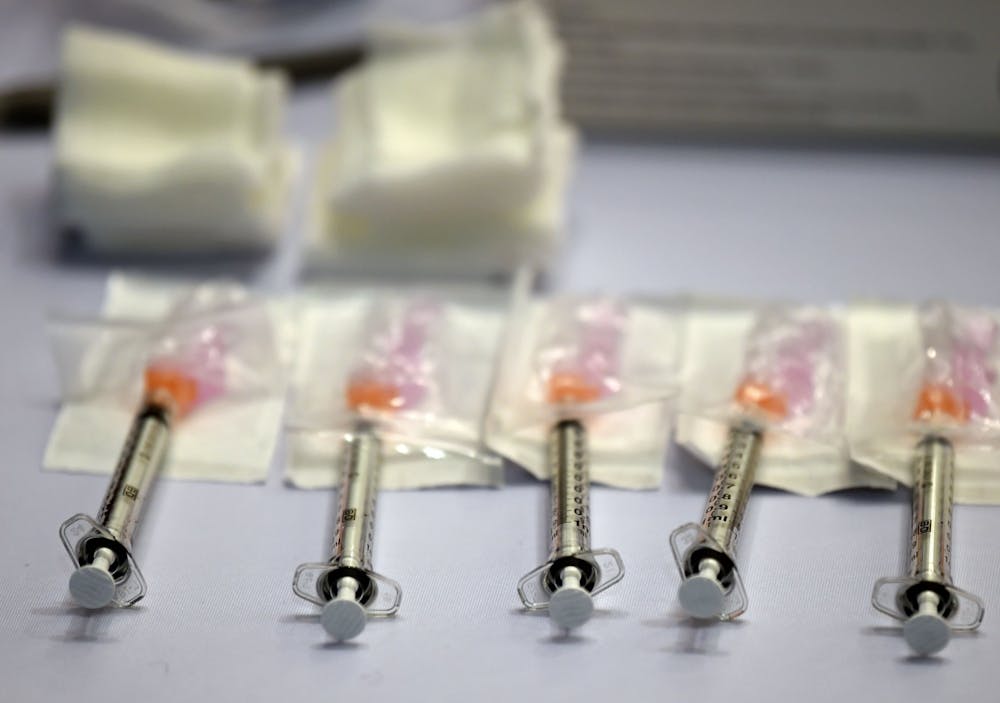All Hoosiers aged 16 and older can sign up to receive the COVID-19 vaccine in Indiana on Wednesday.
The Indiana Daily Student interviewed Katharine Head, IU-Purdue University communications studies professor, Dr. Lana Dbeibo, director for IU vaccine initiatives as part of the vaccine response team, and Gregory Zimet, IU School of Medicine professor of pediatrics and clinical psychology, to discuss vaccine concerns.
What do you think are some of the important things that people need to be doing and hearing about before they go in for that second one or even after the second shot?
Head: “I think the important thing to remember about this vaccine is that the side effects are normal.They're expected. The way these vaccines work, they elicit a strong immune response, and so you may feel kind of crappy the next day or two, have a fever, feel rundown or tired, have a sore arm. Those things are uncomfortable, admittedly, but they are not a sign that the vaccine isn't working, they’re a sign that the vaccine is working … The other thing to remember is that an incredible amount of science went into developing these vaccines.”
Related: [‘Our best chance’: Meet one of the nurses racing to vaccinate Bloomington against COVID-19]
Why do you think it is so important for the communication about this vaccine being done the way it is?
Head: “Vaccine hesitancy is a real thing. The World Health Organization actually listed vaccine hesitancy, as one of the top 10 global health threats that we face. I think that's important to digest a little bit: It's not vaccine preventable diseases but vaccine hesitancy, which could really hinder our ability to get people vaccinated and fight off these vaccine-preventable diseases. And so it's really important from a public health, from a communication perspective, for us to think about how we can clearly and effectively communicate with people who are hesitant about vaccines.”
What do you think is the most important thing for people to know who’re starting to schedule vaccine appointments?
Dbeibo: “One thing to know is that all vaccines are great in preventing you from getting severely ill from COVID. Try to get the vaccine that you can get as soon as possible … There's not one that is dramatically different medically speaking from the other so, whatever you can get first try to get it … Things to keep in mind, that 16- to 18-years-old, so our younger students, can only get Pfizer because the Johnson and Johnson and the Moderna vaccines are only approved for those 18 and older, and Pfizer is the only one that will be available for this younger age group.”
Related: [Hoosiers could wait over 3 weeks to receive COVID-19 vaccine at Assembly Hall]
Do these vaccines come at a cost to anybody or with the program?
Dbeibo: “The vaccines are provided at no cost regardless where you get the vaccines from. There is a potential for, if you have insurance and only if you have insurance, for the sites to ask for your insurance information to bill for an administration fee … people who don't have insurance, they don't really need that requirement they can just say, ‘I don't have insurance,’ and they will still get the vaccine.”
What are we seeing about people accepting getting this vaccine and education on public health?
Zimet: “This is sort of good news and bad news I would say. The good news is that, I think there's a fair amount of enthusiasm about getting vaccinated and reluctance to vaccinate has decreased over time … But the not so good news is that there are still individuals and groups of individuals who are quite hesitant and not interested in vaccinating, based on the research that my group has done.”
Where do you see the future of vaccination and vaccine development going from here?
Zimet: “My hope is as a kind of vaccine focused researcher and a strong believer in vaccination, that we’ll sort of be entering a golden age of vaccine development …Assuming the Pfizer-BioNTech, collaboration and the Moderna, new technology that they've been able to use, the mRNA technology. I am assuming that they are looking at other potential vaccine preventable diseases and seeing about applying that technology.”
Related: [IU considering COVID-19 vaccine requirement for students, employees]




